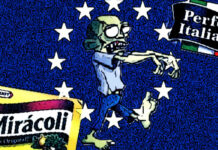Parmigiano Reggiano DOP Consortium beats Campbell’s. The king of hard cheeses has scored a victory in the U.S. against the soup and canned sauces giant, which had dared to evoke Parmesan with suggestive imagery in one of its ‘Prego’ brand products. A step forward in the long battle againstItalian sounding. An in-depth look at a topic more complex than it may appear.
‘You’re welcome’, serial imitation of Made in Italy food
The ‘Prego’ trademark-registered by Campbell’s (U.S.A.) internationally, on various Classes of food products-represents an example of serial imitation of Made in Italy on foods that have only the name of Italian. This is the phenomenon of so-called Italian sounding, or implied counterfeiting.
Widespread-and unpunished-deception of consumers around the world is configured. Who are systematically misled about the actual origin of the products (understood as the country where their last substantial processing took place) and their ingredients.
Italian sounding, the rules (disapplied) in the European Union
The ‘Food Information Regulation‘ (FIR, EU reg. 1169/11), like the earlier directives on food labeling, presentation and advertising (dir. 1979/112/EEC and subsequent ones, most recently dir. 2000/13/EC repealed by the FIR), requires mandatory indication of the country of origin of food products whenever its omission could mislead consumers. Taking into account the indications and images with which the products are presented.
Consequently, in all cases in which names, wording and expressions, photographs or pictograms may imply that a food was produced (or processed) in a country other than the actual country the specific obligation to specify Made in applies. Even when the suggestion comes from words and images contained in a trademark, whether registered or not. As pointed out by former Commissioner for Health and Consumer Protection Vytenis Andriukaitis, at the dawn of the implementation of the FIR. (1)
Primary ingredient origin, information requirements in EU
Reg. EU 2018/775 then introduced, effective 1.4.20, a requirement to indicate the origin or provenance of the primary ingredient (>50% in the recipe, or characterizing ingredient) when it differs from the declared (or suggested) Made in, albeit on a voluntary basis. (2)
The application of the aforementioned regulation has been postponed, in Italy. With a MiSE Circular 23.4.20 which, moreover, has no legal value, since an act of secondary legislation cannot derogate from a supra-constitutional norm. In any case, Italian control authorities will allow the disposal of stocks of non-compliant labels and packaging, even if purchased before 1.4.20, until 31.12.20. (3)
‘You’re welcome,’ the Parmesan of too much.
The ‘Prego’ brand label that triggered the ire of the Parmigiano Reggiano DOP Consortium featured a photographic image of cheese portions decorated with the well-known dots known to be stamped on the wheels of Italy’s king of hard cheeses.
A figurative evocation that is difficult to counter at first glance. The multinational Campbell’s was relying on the lack of recognition of protection of European PDOs in the US. But the Parmigiano Reggiano DOP Consortium went further in stating its case.
Parmesan, the consumer’s right
It should be noted that the symbolic depiction is already sufficient to mislead the consumer as to the identity of the ingredient. Following an approach that in the Old Continent has also been affirmed by the European Court of Justice, in its 2.5.19 ruling on Queso Manchego PDO. (4)
And it is precisely the risk of an exemplary conviction in the U.S.-where deception of consumers can be punished with multimillion-dollar penalties based on well-established case law-that has led the soup giant to capitulate. Undertaking, by out-of-court agreement, to remove any reference, even if only evocative, to Parmigiano Reggiano from the labels of ‘Prego’ sauce packages.
‘This success stimulates further confidence in the battle to defend ‘parmesan’ that we have been waging for decades, first in Europe and now worldwide. The fact that a multinational company like Campbell uses images of Parmesan cheese on a product that contains ‘Parmesan,’ this is clear evidence that for Campbell’s consumers the name ‘Parmesan’ is not generic, and is linked to the PDO Parmigiano Reggiano. (Nicola Bertinelli, President of the Consortium of Parmigiano Reggiano DOP)
PDO, PGI, TSG. The protection that is missing
Geographical Indications (GIs)-that is, names associated with traditional products of territories-find recognition and appropriate protection in only a few legal systems. As in the European Union and China, which on 6.11.19 agreed to mutual recognition of each other’s GIs.
Instead, U.S. policy is driven by Big Food corporations. Which-having no characteristic food productions, in a relatively young and multi-ethnic country-systematically imitate traditional products from other countries. Particularly the Italian ones, starting with Parmesan whose number one producer in the world is Kraft Foods.
The protection of products characteristic of traditions and territories-in the U.S. as in Canada and many other countries-is therefore entrusted to the ordinary regime of intellectual and industrial property protection that relies on trademarks. Be it, where appropriate, with the variants of collective marks and certification marks.
North American food industry lobbyists , as if that were not enough, carry on a battle to assert the ‘genericness’ of registered names. With the aim of denying the legitimacy of their registration as trademarks and thus the right of exclusive use in the hands of their owners.
PDO, PGI, TSG. Identity and protection regime in EU
PDOs-Protected Designations of Origin-along with PGIs (Protected Geographical Indications) fall under the concept of Geographical Indications (GIs). Names and signs associated with products that are recognized and registered, based on objective criteria, as characteristic of traditions and territories. And they therefore receive special protection, in some legal systems.
The recognition of GIs began in Europe, specifically in the cheese sector, with the Stresa Convention (1951). And it was developed in the European Economic Community, now the European Union, under the PDO and PGI regime (EEC Reg. 2081/1992, now EU Reg. 1151/12). (6) In addition to that, residual and attenuated, of TSGs (Traditional Specialities Guaranteed, EU reg. 2082/92 , now EU reg. 1151/12).
Registration of a PDO, as a ‘name identifying a product,’ is subject to verification of stringent requirements:
(a) origin of the product related to a place, region or country,
(b) qualities and/or characteristics essentially or exclusively due to the geographical area and its inherent, traditional natural and human factors,
(c) production entirely carried out in the geographical area defined in the specification (reg. EU 1151/12, Article 5.1). Neglecting, however, traditionality and origin of seed and feed in many specifications.
PGI differs from PDO in that for the purpose of its registration it is sufficient that one of the production steps is carried out in the defined geographical area. And it is therefore sufficient thata given quality, reputation or other characteristicis ‘essentially‘ (not also ‘exclusively‘) ‘attributable toits geographical origin’ (reg. EU 1151/12, Article 5.2).
TSG in turn is eligible for registration and protection as it designates a specific product or food:
(a) obtained by a method of production, processing or composition that corresponds to a traditional practice for such product or food; or
(b) obtained from traditionally used raw materials or ingredients.
The name to be registered as a TSG in turn must be able to boast its traditional use in reference to the specific product, i.e., designate the traditional character or specificity of the product (reg. EU 1151/12, Article 18).
The protection of GIs in the EU involves the prohibition of:
(a) any direct or indirect commercial use of a registered name for unregistered products,
(b) any usurpation, imitation or evocation of the registered name, (7)
(c) any other false or misleading indication concerning the provenance, origin, nature and essential qualities of the product used on the wrapping or packaging, in advertising material or on documents relating to the product in question,
(d) any other practice that could mislead the consumer about the true origin of the product (reg. EU 1151/12, Article 13). (8)
EU member states, including through specially designated authorities, must take appropriate administrative and judicial measures to stop-as well as to prevent-unlawful use of geographical indications.
Dario Dongo and Francesca Coli
Notes
(1) Dario Dongo.
Requirement to indicate country of origin on ‘Italian sounding’ products.
. FARE(Food and Agriculture Requirements). 6/18/15, https://www.foodagriculturerequirements.com/archivio-notizie/europa-obbligo-di-indicare-il-paese-d-origine-sui-prodotti-italian-sounding
(2) Dario Dongo, Alessandra Mei. Primary ingredient origin, reg. EU 2018/775, European Commission guidelines. GIFT (Great Italian Food Trade). 18.1.20, https://www.greatitalianfoodtrade.it/etichette/origine-ingrediente-primario-reg-ue-2018-775-linee-guida-commissione-europea
(3) Dario Dongo, Martina Novelli. Reg. EU 2018/775, MiSE admits disposal of non-compliant labels. GIFT (Great Italian Food Trade). 4/23/20, https://www.greatitalianfoodtrade.it/etichette/reg-ue-2018-775-il-mise-ammette-lo-smaltimento-di-etichette-non-conformi
(4) Dario Dongo.
PDO, EU Court of Justice clarifies ban on evocations.
GIFT(Great Italian Food Trade). 3.5.19, https://www.greatitalianfoodtrade.it/etichette/dop-la-corte-di-giustizia-ue-chiarisce-il-divieto-di-evocazioni
(5) Luis González-Vaqué, Martín Cortés. (2008). ECJ – Judgment of February, 26, 2008, Commission V. Germany, “Parmesan,” C-132/05 – The Court lays down the extent of the protection granted to a registered designation of origin in response to its misuse. Revista de Derecho Comunitario Europeo. 12. 545-563
(6) Reg. EU 1151/12, on quality schemes for agricultural products and foodstuffs
(7) Dario Dongo. 100% Sicilian extra virgin olive oil, lawyer Dario Dongo replies. FARE(Food and Agriculture Requirements). 6.1.19, https://www.foodagriculturerequirements.com/archivio-notizie/domande-e-risposte/olio-extravergine-d-oliva-100-siciliano-risponde-l-avvocato-dario-dongo
(8) Dario Dongo. Taggiasca olive, the lifeboat. 3/29/19, https://www.greatitalianfoodtrade.it/mercati/oliva-taggiasca-la-scialuppa-di-salvataggio









